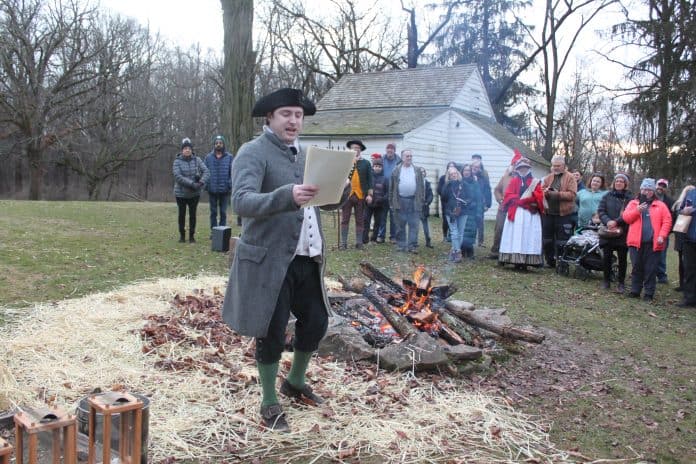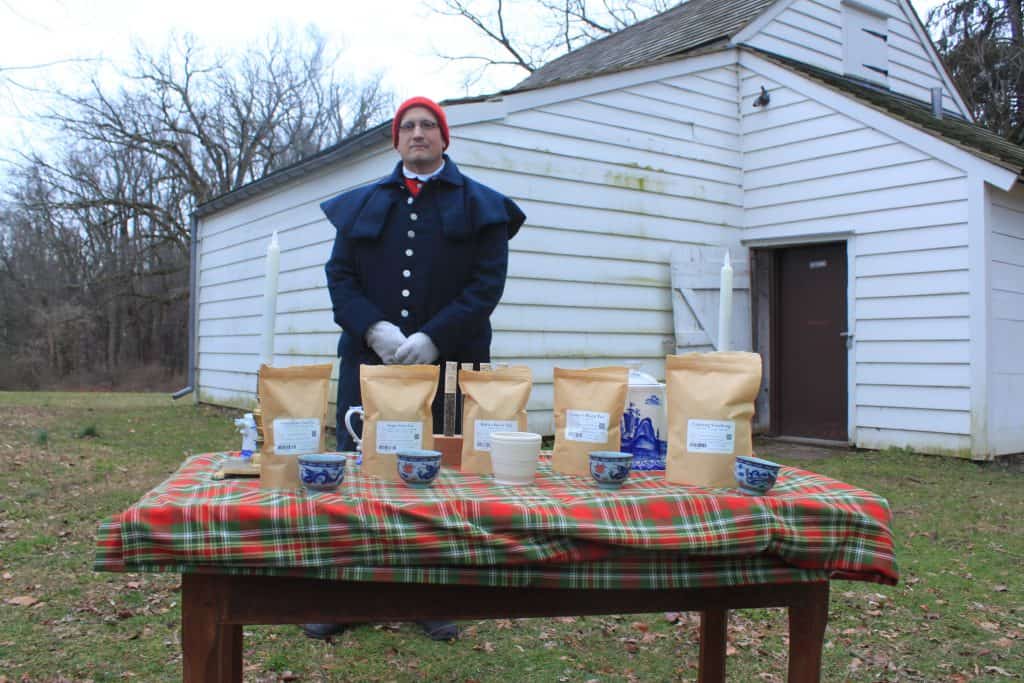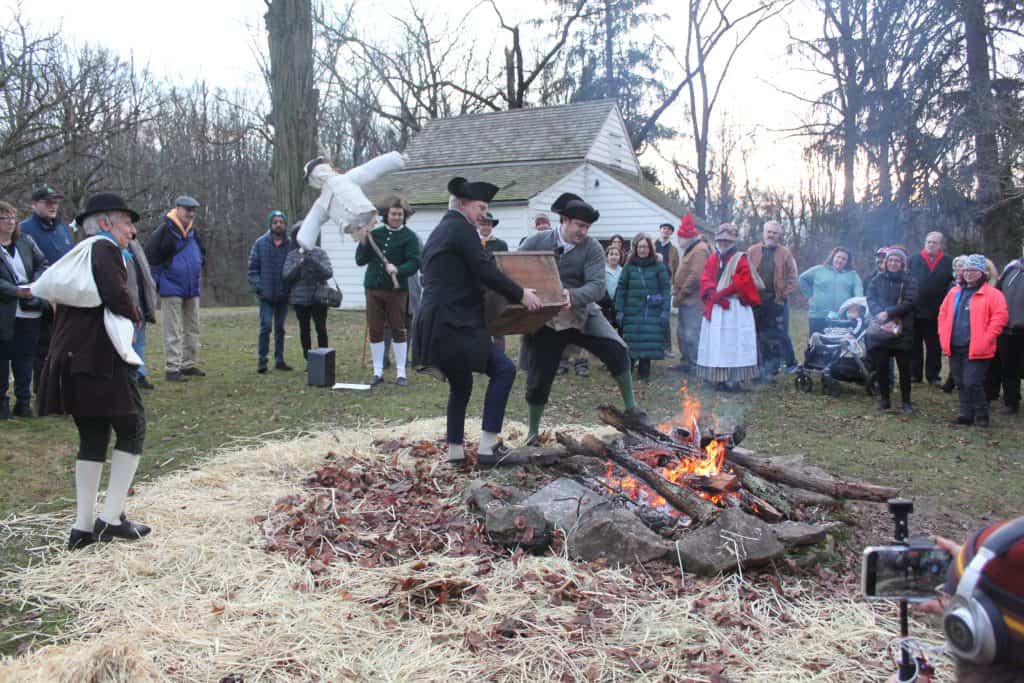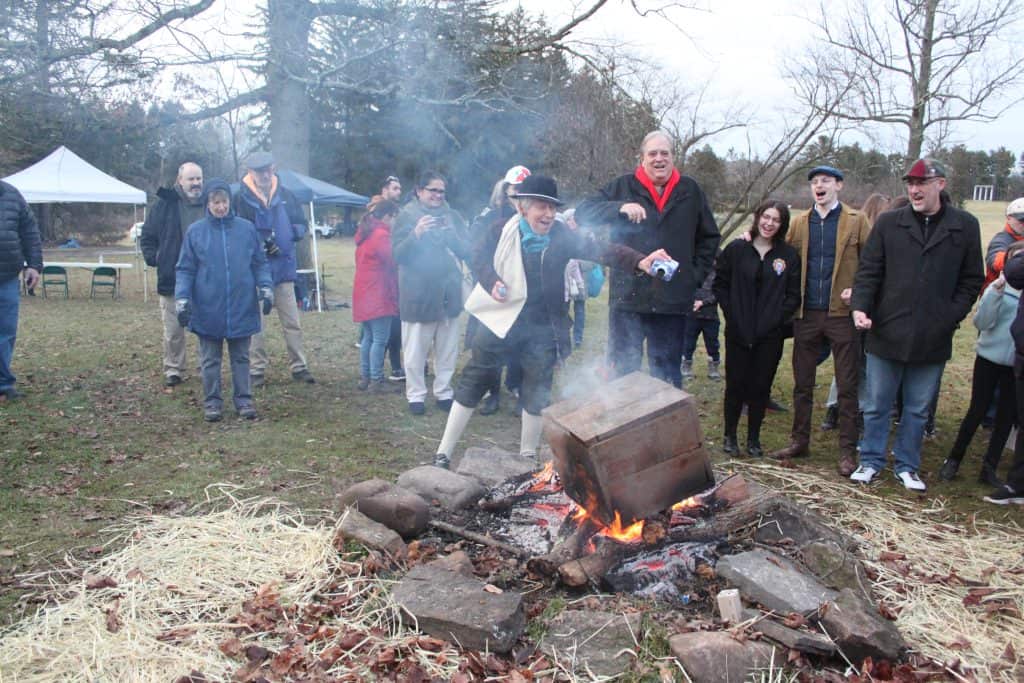
More than 60 people crowded around a small bonfire at the Princeton Battlefield State Park to commemorate the 250th anniversary of the Princeton Tea Party on Jan. 27.
Yes, the Princeton Tea Party.
The exact date is not known, but during the last week of January 1774, students scooped up all of the tea from the commissary at The College of New Jersey, now known as Princeton University.
Not content with gathering the winter’s supply of tea for the college, the students went house to house in the small village of Princeton to round up tea from its residents.

The students took the tea, which totaled 12 pounds, and tossed it into a bonfire in front of Nassau Hall, said Will Krakower, resource interpretive specialist at the Princeton Battlefield State Park.
Huddled around the bonfire, the students took an oath to boycott British goods until the Tea Act was repealed – not drink tea and to support the Sons of Liberty, Krakower said.


The Sons of Liberty are believed to have been behind the more famous Boston Tea Party, which took place about one month earlier on Dec. 16, 1773. The group was founded to protest the Stamp Act and other forms of taxation imposed on the colonists, according to www.history.com.
The students were inspired to hold their own tea party after they learned about the Boston Tea Party from messenger Paul Revere, Krakower said.
Revere had stopped in Princeton on his way to deliver mail from the Boston Committee of Correspondence to the committees in New York City and Philadelphia, he said. The committees acted as provincial governments.
The Boston Tea Party grew out of colonists’ dissatisfaction with taxes imposed on them by the British Parliament in the 1760s. The taxes were intended to cover the debt incurred by the British in fighting wars to defend the colonists, according to www.history.com.
The Parliament repealed most of the taxes, except for a tax on tea under the Townshend Revenue Act of 1767. The colonists reacted by boycotting tea sold by the British East India Company and by smuggling in Dutch tea. The boycott threatened the economic health of the British East India Company.
The British Parliament passed the Tea Act in May 1773, which allowed the British East India Company to sell tea to the colonies duty-free and for less than other tea companies – but to still tax it when it reached colonial ports.
Tea smuggling persisted, and colonists continued to protest to being taxed without having a representative in Parliament – or taxation without representation.
In December 1773, the Sons of Liberty held meetings to protest the arrival of a British East India Company ship carrying tea in Boston Harbor. By mid-December, the Dartmouth was joined by the Beaver and the Eleanor, which carried tea from China, in the harbor.
At a meeting held Dec. 16, 1773 in Boston, a large group of colonists voted to refuse to pay taxes on the tea or to allow it to be unloaded, sold or used.
Massachusetts Gov. Thomas Hutchinson would not allow the three ships to leave Boston Harbor and return to Great Britain. He ordered the tea to be unloaded and the tax to be paid, but the colonists resisted.
On the evening of Dec. 16, 1773, a group of men – some of whom were alleged to be members of the Sons of Liberty – disguised themselves as Native Americans and boarded the three ships.
The men opened up 342 chests of tea and tossed their contents into Boston Harbor. The 90,000 pounds of tea was valued at $1.3 million, in today’s dollars.
King George III and the British Parliament responded by passing the Coercive Acts, later know as the Intolerable Acts.
The acts closed Boston Harbor until the tea was paid for and also ended the Massachusetts Constitution. The free election of town officials was halted. Martial law was declared in Massachusetts.
Britain was banking on the Intolerable Acts to put a stop to the rebellion in New England but instead it led to the convening of the First Continental Congress in September 1774 – and the first steps on the road to the American Revolutionary War.

